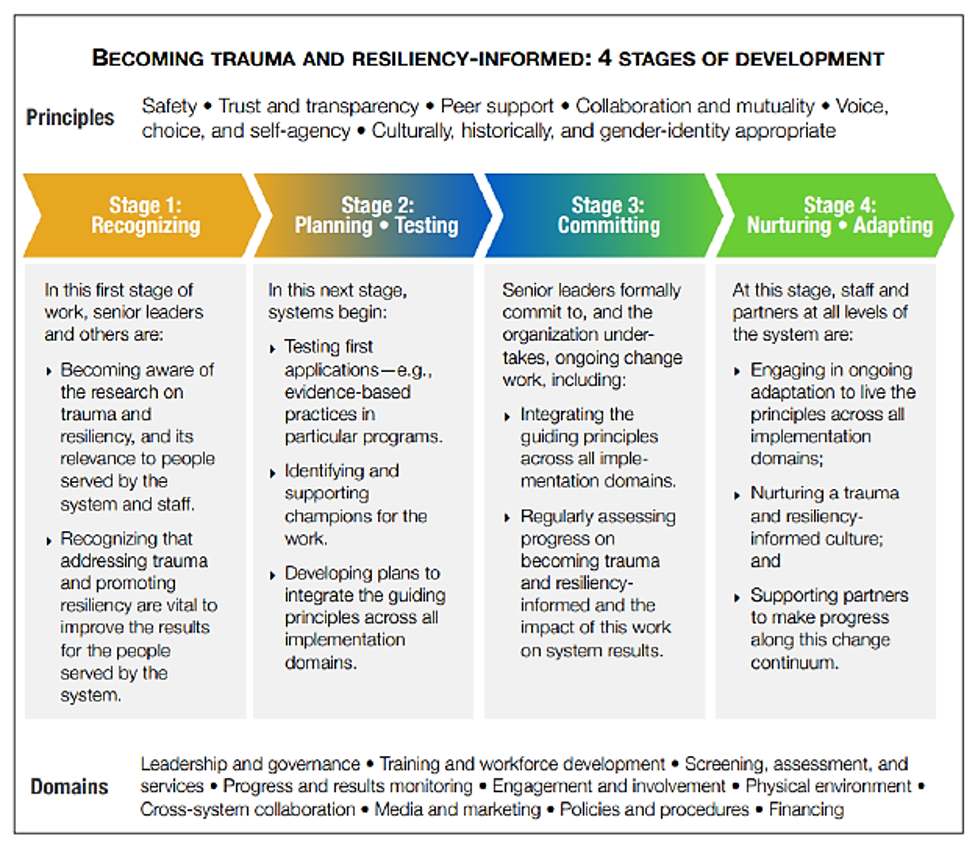
I’m Tamara Hamai, PhD, President of Hamai Consulting and President-Elect of the National Partnership to End Interpersonal Violence. I’ve dedicated my career to rebuilding our global systems to encourage children’s holistic growth and well-being, from prenatal through completion of higher education.
Lessons Learned:
In the chapter Adverse Childhood Experiences: Past, Present, and Future, that I co-wrote with Dr. Vincent Felitti for the Handbook on Interpersonal Violence and Abuse Across the Lifespan, we highlighted the lessons we learned when reviewing Adverse Childhood Experiences (ACEs) research:
- Researchers know a lot about ACEs, but we need greater awareness and action from the general public, schools, service providers, judicial systems, legislation, etc.
- De-stigmatizing and normalizing talking about and screening for trauma is critical.
- Because of the difficulty in treating the consequences of ACEs after the fact, primary prevention is of profound importance.
A Systems Approach
These lessons are not problems solved by individuals or individual organizations. They require strengthening and building systems to address trauma at all levels. Conditions within communities, organizations, and systems sustain and worsen the consequences of trauma, re-traumatize, and lead to chronic exposure to trauma.
Building trauma- and resilience-informed systems is an emerging area of work, and the definition of what makes a system trauma-informed is still being molded. In our work with First 5 San Mateo County’s Trauma and Resilience Informed Systems Initiative (TRISI), our definition is that trauma- and resilience-informed systems “integrate policies, procedures, and practices into its programs, structures, and culture to actively resist re-traumatization, strengthen resilience, and heal the effects of trauma for individuals and organizations. TRIS adopt and follow these core principles:
- Understanding Stress and Trauma
- Reducing Structural Racism and Bias
- Strengthening Resilience
- Promoting Safety and Stability
- Cultivating Compassion and Trust
- Fostering Collaboration and Agency
We are leading cohorts of organizations through the process of becoming trauma-informed, supplemented by coaching delivered by Trauma Transformed. Progress in becoming trauma-informed follows the Center for Collective Wisdom’s developmental framework:

Hot Tip:
As with trauma-informed care, becoming a trauma-informed organization or system means embedding internal processes that promote deep self-reflection focused on uncovering and healing internal causes and consequences of trauma. Assessments can serve as tools to aid self-reflection and to measure growth in trauma-informed practices and policies (yes, you can evaluate these outcomes!).
We’re using an assessment tool adapted from Michigan Department of Health and Human Services’ Becoming Trauma-informed: Guide for Child Serving Programs & Organizations with influences from SAMHSA, the Network of Infant/Toddler Researchers, The Office of Adolescent Health, The University of Southern Florida, and the work of Dr. Roger Fallot and Dr. Maxine Harris. Another assessment tool option is the Trauma-informed Agency Assessment (TIAA) by Maine THRIVE.
Rad Resources:
National Child Traumatic Stress Network’s Trauma-Informed Schools for Children in K-12: A System Framework and Creating, Supporting, and Sustaining Trauma-Informed Schools: A System Framework.
Center for Collective Wisdom’s Trauma and Resiliency: A Systems Change Approach
This week, AEA365 is hosting Trauma-informed Eval Week during which blog authors share lessons from and principles of trauma-informed evaluation. Do you have questions, concerns, kudos, or content to extend this aea365 contribution? Please add them in the comments section for this post on the aea365 webpage so that we may enrich our community of practice. Would you like to submit an aea365 Tip? Please send a note of interest to aea365@eval.org. aea365 is sponsored by the American Evaluation Association and provides a Tip-a-Day by and for evaluators.

Dear Tamara,
Thankyou for sharing such an informative and thought-provoking blog post on a very important topic in education. You say that “becoming a trauma-informed organization or system means embedding internal processes that promote deep self-reflection focused on uncovering and healing internal causes and consequences of trauma.” I am extremely curious to learn more about the self assessment tools, guides and toolkits you have shared. I see a direct connection to how the tools you have shared could help to leverage this system level priority in my work context and move us along in the stages of development. I serve as a Principal of Curriculum in a metro school division in Winnipeg, Manitoba and as such am involved continuous improvement efforts at the system level.
Our school division data shows that the Indigenous students that we serve are more likely to demonstrate challenges in learning achievement as compared to non-Indigenous students. As a system we continue to focus on ways in which to support all children towards improved academic and social emotional outcomes. As a way to support many of our most vulnerable who are experiencing great challenges in finding belonging and success in school, the school board encourages and supports the need for a divisional Indigenous student success team. This is a team of four itinerant teachers that are working in schools with the highest percentage of self declared Indigenous students. Through this response, we are able to support students in nine of our early and middle years schools plus another five of our high schools.
The ISS team, along with division social workers, engage with students that are facing incredible life challenges. In many ways, these divisional supports act in ways of providing, support, advocacy, connection with Elders, cultural programming, family connection, and resources. Currently, we work in partnership with an Indigenous Scholar in Residence and he has spotlighted the unique needs of Indigenous students given the fast past and high demands of a westernized school system. One of his primary recommendations to our senior leaders has been to focus on becoming a “trauma informed organization at the system level” and as such influenced my interest in your post. He states, “Every teacher should have at least basic training in Trauma-informed care and practice.”
I see your resources as being a perfect fit to support our efforts in becoming a system level trauma informed organization. We are working hard to be inclusive and develop an awareness for the day to day impact that personal trauma may have on Indigenous student’s achievement and performance. The questions that come to mind for me are, once we are ‘informed’ then what do we do? How might educators best support progress for students experiencing trauma related circumstances that are impacting their ability to flourish and learn in our system?
The four stages of development visual would place my school division at the beginning of stage 4 – Commitment. The senior leaders in the division have committed to the ongoing change work in this area. We are currently in the process of identifying best practices and system level guiding principles, informed through our collaboration with the Scholar in Residence and community Elders, to help develop shared understandings and consistency across the entire school division.
The next steps in this work will be to consider messaging and system implementation processes as well as the ongoing assessment of progress towards this priority. From your experience in leading cohorts through the process of becoming trauma informed, what would be some key highlights, considerations and lessons learned that you could share. Your insights and experience will help to support my own thinking in this area as we work towards capacity building in our mission towards continuous improvement, system wide.
Thankyou for your thoughtful and important post and for sharing the tools and resources!
Respectfully,
Julie